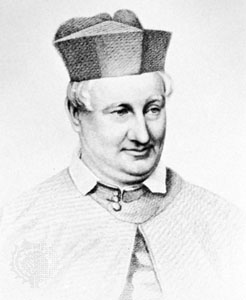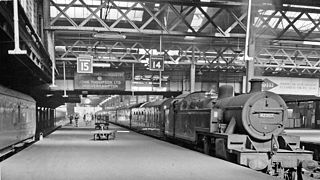
Frederick William Faber was a noted English hymnwriter and theologian, who converted from Anglicanism to Roman Catholicism in 1845. He was ordained to the Catholic priesthood subsequently in 1847. His best-known work is the hymn "Faith of Our Fathers".

Frederick Louis MacNeice was an Irish poet, playwright and producer for the BBC. His poetry, which frequently explores themes of introspection, empiricism, and belonging, is considered to be among the greatest of twentieth century literature. Despite being renowned as a member of the Auden Group, he was also an independently successful poet with an influential body of work, which is replete with themes ranging from faith to mortality. His body of work was appreciated by the public during his lifetime, due in part to his relaxed but socially and emotionally aware style. Never as overtly or simplistically political as some of his contemporaries, he expressed a humane opposition to totalitarianism as well as an acute awareness of his roots.
The Penguin poetry anthologies, published by Penguin Books, have at times played the role of a "third force" in British poetry, less literary than those from Faber and Faber, and less academic than those from Oxford University Press..
Peter McDonald is a poet, university lecturer, and writer of literary criticism. He holds the post of Christopher Tower Student and Tutor in Poetry in the English Language at Christ Church, a college of the University of Oxford.

The Faber Book of Irish Verse was a poetry anthology edited by John Montague and first published in 1974 by Faber and Faber. Recognised as an important collection, it has been described as 'the only general anthology of Irish verse in the past 30 years that has a claim to be a work of art in itself ... still the freshest introduction to the full range of Irish poetry'. According to Montague, "I'm dealing with a thousand years of Irish verse in under four hundred pages. I needed a thousand pages.'
Laurence Duval Gilliam, OBE was a BBC radio producer.

Proinsias Mac Airt was an Irish republican activist and long-serving member of the Irish Republican Army.
McNeice is a surname. Notable people with the surname include:

The Earth Compels was the second poetry collection by Louis MacNeice. It was published by Faber and Faber on 28 April 1938, and was one of four books by Louis MacNeice to appear in 1938, along with I Crossed the Minch, Modern Poetry: A Personal Essay and Zoo.

Zoo is a book by Louis MacNeice. It was published by Michael Joseph in November 1938, and according to the publisher's list belongs in the category of belles lettres. It was one of four books by Louis MacNeice to appear in 1938, along with The Earth Compels, I Crossed the Minch and Modern Poetry: A Personal Essay.

"Carrickfergus" is a 44-line poem by Louis MacNeice. It was written in 1937 and first published in book form in MacNeice's poetry collection The Earth Compels (1938). The poem reflects on MacNeice's childhood in Carrickfergus, a large town in County Antrim, Northern Ireland. Although the title of the poem is "Carrickfergus", the text of the poem refers to "Carrick", as the town is known locally and colloquially.

Rugby Football Excursion is a 44-line poem by Louis MacNeice. It was written in 1938 and first published in book form in MacNeice's poetry collection The Earth Compels (1938). The poem recounts an excursion taken by MacNeice from London to Dublin, in order to watch a rugby football match at Lansdowne Road stadium. MacNeice does not specify the occasion, but internal evidence from the poem establishes the match as a rugby football international when England defeated Ireland on 12 February 1938, 36 - 14.

The Sunlight on the Garden is a 24-line poem by Louis MacNeice. It was written in late 1936 and was entitled Song at its first appearance in print, in The Listener magazine, January 1937. It was first published in book form as the third poem in MacNeice's poetry collection The Earth Compels (1938). The poem explores themes of time and loss, along with anxiety about the darkening political situation in Europe following the outbreak of the Spanish Civil War. It is one of the best known and most anthologized of MacNeice's short poems. George MacBeth describes it as "one of MacNeice's saddest and most beautiful lyrics".
"Epilogue for W. H. Auden" is a 76-line poem by Louis MacNeice. It was written in late 1936 and was first published in book form in Letters from Iceland, a travel book in prose and verse by W. H. Auden and Louis MacNeice (1937). MacNeice subsequently included it as the last poem in his poetry collection The Earth Compels (1938). "Epilogue for W. H. Auden" reviews the Iceland trip MacNeice and Auden had taken together in the summer of 1936; the poem mentions events that had occurred while MacNeice and Auden were in Iceland, such as the fall of Seville and the Olympic Games in Berlin.
June Thunder is a 28-line poem by Louis MacNeice. It was first published in book form in MacNeice's poetry collection The Earth Compels (1938). The poem begins with memories of idyllic summer days in the countryside - "the unenduring / Joys of a season" - before returning to the present and "impending thunder". June Thunder is written in a loose form of the sapphic stanza, with three lines set in falling rhythm followed by a shorter fourth line. The poem was anthologised in A New Anthology of Modern Verse 1920-1940 (1941), edited by Cecil Day-Lewis and L.A.G. Strong, and Penguin New Writing No. 2.

Autumn Journal is an autobiographical long poem in twenty-four sections by Louis MacNeice. It was written between August and December 1938, and published as a single volume by Faber and Faber in May 1939. Written in a discursive form, it sets out to record the author's state of mind as the approaching World War II seems more and more inevitable. Fifteen years later, MacNeice attempted a similar personal evaluation of the post-war period in his Autumn Sequel.
George Galway MacCannARCA ARUA was a Northern Irish abstract painter and Modernist sculptor, writer and broadcaster. MacCann was born in Belfast, the son of monumental sculptor David and his wife Elizabeth.
The Dark Tower is a 1946 BBC Home Service radio play written, in verse, and produced by Louis MacNeice, with music composed for it by Benjamin Britten. Dramatist and author Robin Brooks, writing in The Guardian in 2017, called it "a landmark in radio drama".
Sir John Charles Nicholson, 3rd Baronet, was an English surgeon. Born in Surrey, and educated at Brighton College and New College, Oxford, he qualified as a surgeon in 1929 and won the Willet Medal for excellence in operative surgery. He was appointed as the house surgeon to many London hospitals, including St Bartholomew's Hospital, where he later became a demonstrator in physiology and pharmacology. Later, he was appointed the surgical registrar to the London Lock, the National Temperance and Royal National Orthopaedic hospitals. From 1950 he was a surgeon at the Bethnal Green, and St Leonard's and St Matthew's Hospitals in East London. He retired to Sunbury-on-Thames in 1969 and died in 1986.
Richard Rutledge Kane (1841–1898) was a Church of Ireland minister, an outspoken Irish unionist and Orangeman, and an early patron of the Gaelic League. A dominant personality in the life of Belfast, his funeral procession in 1898 was purportedly one of the largest seen in the city.










